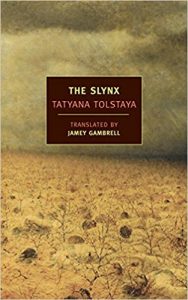 translated by Jamey Gambrell
translated by Jamey Gambrell
April 17, 2007
320 pages
The Slynx, Tolstaya’s first novel after two collections of short stories, is a heady mix of dystopian dreariness and absurd hilarity. Set two hundred years in the future, after some kind of nuclear disaster, the novel follows the lives of those surviving in what was once Moscow. They depend on mice for food and clothing, know almost nothing about the past, and many of them have glaring physical abnormalities: scales all over their bodies, claws instead of toes, atavistic tails. Only a few people in each village tend the communal fire (since no one knows how to start a fire) and some villagers (called Degenerators) are forced to pull sleighs as if they were animals. People also believe in a mythical creature called the “Slynx” that supposedly stalks the surrounding forest, looking to snatch humans. Further on in the book, this creature seems to be just another version of the devil, or basically anything that humans can’t fully grasp and thus fear.
The most fascinating part in all this, to my mind at least, is the fact that just a handful of people living in this nightmarish reality were alive before the Blast: like some of the characters in Antoine Volodine’s postapocalyptic Radiant Terminus, something about the nuclear disaster has slowed down or stopped the aging process. Thus there actually are a few characters in The Slynx who remember what life was like before civilization collapsed and brought culture down with it. These people fondly remember things like tiled floors, grocery stores, and office buildings. Sometimes they quote poetry and dream of bringing about a cultural renaissance, though we as readers increasingly realize that, like dying embers, there is almost nothing left to resurrect.
Books still exist, however, but anyone found with one is hunted down and “dealt with,” their books confiscated, all in the name of stopping “Freethinking.” The main character in the novel, Benedikt, lives much of his young life believing that books are tainted (with radiation and the threat of freethinking), and happily goes about his job copying into booklets those stories, poems, and fables that the village’s clown-like leader hands down week after week for public consumption. Only later does he learn that this leader has simply been copying down passages from books that existed before the Blast and passing them on as his own creations.
When one of Benedikt’s friends (an “Oldener” who hasn’t aged in centuries) commissions him to carve a statue of Pushkin, Benedikt complies, and the result is a depressing monument empty of all meaning. People hang clotheslines from it, carve names and curses into it, and generally use it as if it were simply a post. Thus Tolstaya signals (early on) the futility (but also nobility) of attempting to resurrect a world long since reduced to ashes.
As Benedikt’s material circumstances improve (once he marries into a wealthy family) , he gains access to more and more books, and soon becomes obsessed with them. Ultimately, he leads the confiscation charge each time rumor surfaces about a villager hiding a book. And yet, despite reading thousands of books and magazines and expanding his knowledge, Benedikt is not able to assimilate the ideas and images into a new worldview. He remains stubbornly literal, incapable of understanding, for instance, that the word “higher” can mean anything other than an object positioned in space above another object (“higher education,” for instance, means nothing to him). However, from this position of “knowledge,” Benedikt and his father-in-law try to start their own revolution to usher in an enlightened age- but you can guess what happens next.
Bizarre, absurd, depressing, fasinating: these are the adjectives that come to mind when I think about The Slynx. The idea that a handful of people would try to resurrect a dead civilization based upon their hazy memories and the few books that they’ve managed to hide in their homes is at once thrilling and terrifying. Humanity would, necessarily, be much different after a global disaster, but we might hope that those who survived could pick up the pieces and restore even a small part of their cultural milieu. Tolstaya is not nearly so optimistic.
